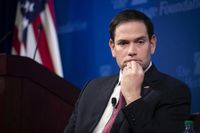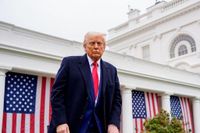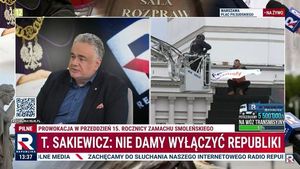In a dramatic escalation of hostilities, Russia launched a devastating attack on the Ukrainian city of Kryvyi Rih on April 4, 2025, killing 19 people, including nine children, and injuring 75 others. This assault came just weeks after the U.S. and Ukraine had agreed to a ceasefire, which Russia promptly rejected. The attack has intensified calls for action from the U.S. government, with President Donald Trump expressing his anger and frustration at Russia's continued aggression.
Despite the agreement on a 30-day ceasefire between Ukraine and the U.S. three weeks prior, Russia has shown no intention of complying. Instead, it has issued a list of demands and continued its bombardment of Ukrainian cities, resulting in civilian casualties. "Russia again and again showed it had no intention to stop the killings," local authorities reported, highlighting the dire situation on the ground.
Trump's administration has been under pressure to respond decisively to Russia's actions. Analysts suggest that the U.S. holds significant leverage over Moscow, including the potential to increase military aid to Ukraine and enforce existing sanctions more rigorously. However, Trump has so far opted for minor sanctions against Russian businesses rather than taking stronger measures. Jenny Mathers, a lecturer in international politics at Aberystwyth University, criticized Trump's approach, stating, "There have been some vague threats now and again about what Trump might do, but so far he has allowed President Vladimir Putin to completely dictate the terms of the partial ceasefire."
On March 30, Trump expressed his frustration during an interview with NBC News, stating he was "pissed off" and "very angry" about Putin's demands for a transitional government in Ukraine. He warned that if a deal to stop the bloodshed could not be reached, he would impose secondary tariffs on Russian oil, potentially ranging from 25% to 50%. This threat was reiterated on March 31, when Trump stated that he would take further action if Putin did not engage in productive negotiations.
In a show of bipartisan support for Ukraine, a group of 50 U.S. senators introduced legislation on April 1 that would impose a staggering 500% tariff on goods from countries purchasing Russian oil, gas, and uranium, should Russia refuse to negotiate in good faith. This move underscores the urgency among U.S. lawmakers to hold Russia accountable for its actions.
As tensions continue to rise, Secretary of State Marco Rubio has stated that the U.S. has given Russia a few weeks to agree to a ceasefire before increasing pressure. He emphasized that the U.S. recognizes Russia's violations of the ceasefire agreement reached in Saudi Arabia, asserting, "If there are delaying tactics, we won’t be interested in this; Trump will not engage in endless negotiations. We will soon know whether Russia is serious about peace. If they are, great; if not, we will need to reassess our course of action." Rubio's remarks reflect a growing impatience within the U.S. administration regarding Russia's lack of commitment to peace.
Ukraine has demonstrated its readiness for a ceasefire, with European allies and Canada urging Putin to respond immediately to the U.S. proposal for a partial ceasefire, which Ukraine accepted unconditionally. President Volodymyr Zelenskyy believes that Washington is preparing to impose new sanctions against Russia to expedite an end to the conflict.
Despite Trump's threats to impose tariffs, experts remain skeptical about the feasibility of such measures. Oleksandr Parashchiy, an analyst at Ukrainian investment bank Concorde Capital, noted that while additional sanctions could effectively block Russian oil exports, they could also lead to significant repercussions for both the global and U.S. economies. "Russian oil still accounts for a considerable share of the international oil market (around 7-8%)," he stated, emphasizing the complexity of the situation.
Moreover, the current sanctions imposed by the Trump administration have not been robust enough to exert meaningful pressure on Russia. On March 13, the U.S. toughened sanctions on Russia's oil and gas industry by not renewing an exemption that allowed Russian banks access to U.S. payment systems for energy transactions. However, the effectiveness of this measure has been called into question, especially after Hungary received a waiver from the U.S. to continue purchasing Russian gas.
In addition to sanctions, there are calls for the U.S. to increase military aid to Ukraine as a means of pressuring Russia. Mathers and Stefan Wolff, a professor of international security, argue that a combination of sanctions and military support could significantly alter the dynamics of the conflict. Pavytska, a sanctions program manager at the Kyiv School of Economics, suggested that the U.S. should target Russia's shadow fleet and apply the price cap on Russian oil to Chinese and Indian ports, rather than solely on Russian ports.
Despite these discussions, the Trump administration has not yet taken decisive action. Reports indicate that Trump's inner circle is advising him to refrain from direct communication with Putin until he agrees to a full ceasefire, reflecting a cautious approach to diplomacy.
As the situation evolves, it remains to be seen whether Trump's threats will translate into concrete actions. The recent assault on Kryvyi Rih underscores the urgent need for a resolution to the conflict, and with Congress prepared to approve new sanctions, the pressure on Russia is mounting. The next few weeks will be critical in determining the course of U.S.-Russia relations and the future of peace in Ukraine.





